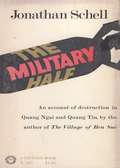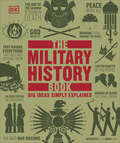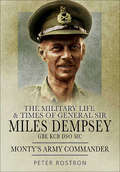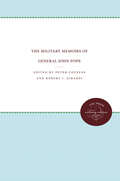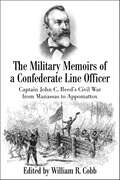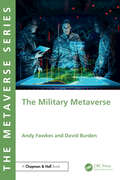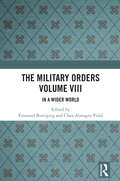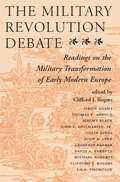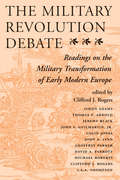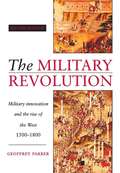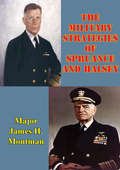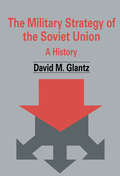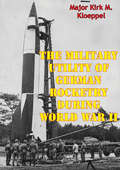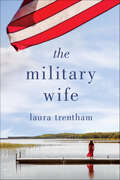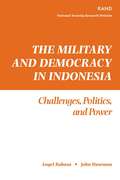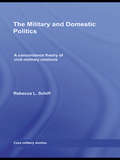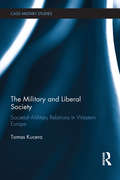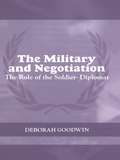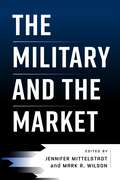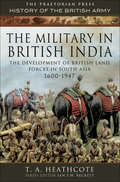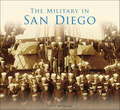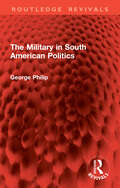- Table View
- List View
The Military History Book (DK Big Ideas)
by DKDiscover the key themes and big ideas behind the key events in the history of warfare—from the dawn of civilization to the 21st century.Tracing the epic 5,000-year story of warfare from the earliest battles to the War on Terror, The Military History Book explores and explains the causes and consequences of each, offering a new angle on military history. Entries analyze the key social and political driving forces, the arms and armaments, and the technologies and tactics of war from 5,000 years ago to the present day—from the tactics of early infantry and siegecraft to the rise of naval combat steel, steam, and shellfire to trench warfare and aerial dogfights to chemical weapons and cyber warfare.Making each episode accessible and easy to understand, and bringing military history to life like never before, with stunning visuals, authoritative text, and memorable quotes, The Military History Book is the perfect gift for military enthusiasts of all ages.
The Military Life & Times of General Sir Miles Dempsey GBE KCB DSO MC: Monty's Army Commander
by Peter RostronMiles Dempsey, Commander of the British Second Army in the invasion of Europe 1944-45, is almost unknown to the general public. Yet his part in Britains contribution to that campaign was second only to Montgomerys in importance. Dempsey survived two and a half years of bitter fighting as an infantry officer on the Western Front before accompanying his beloved Royal Berkshire Regiment in the little-known North West Persia campaign of 1920-21. In six years he rose from Major to command over half a million men in the largest combined operation in history, and led them to victory a year later.Based on sources which include some of Dempseys previously unpublished work and the views of those who knew him, the book traces his career as a soldier of rare distinction, a talented sportsman and a man of huge charm and shrewd intellect, dedicated to his beloved regiment and ever mindful of the lives of his soldiers. Peter Rostron examines his methods of command and his relationships with Montgomery, his Corps commanders, the Americans and the RAF. It highlights his crucial role in the Dunkirk evacuation, the training of the Canadian Army, and the invasion of Sicily, Italy, and North West Europe, and analyses why his army performed so brilliantly on D Day. Lasly, Rostron examines his contribution to the campaign in Europe, focussing on the controversial operations of EPSOM, GOODWOOD, Arnhem and the Rhine Crossing.
The Military Memoirs of General John Pope (Civil War America)
by Peter Cozzens Robert I. GirardiUnion general John Pope was among the most controversial andmisunderstood figures to hold major command during the Civil War.Before being called east in June 1862 to lead the Army of Virginia against General Robert E. Lee, he compiled an enviable record in Missouri and as commander of the Army of the Mississippi. After his ignominious defeat at the Second Battle of Bull Run, he was sent to the frontier. Over the next twenty-four years Pope held important department commands on the western plains and was recognized as one of the army's leading authorities on Indian affairs, but he never again commanded troops in battle. In 1886, Pope was engaged by the National Tribune, aweekly newspaper published in Washington, D.C., to write a seriesof articles on his wartime experiences. Over the next five years, in twenty-nine installments, he wrote about the war as he had lived it. Collected here for the first time, Pope's "war reminiscences" join a select roster of memoirs written by Civil War army commanders. Pope presents a detailed review of the campaigns in which heparticipated and offers vivid character sketches of such illustrious figures as Abraham Lincoln and Secretary of War Edwin M. Stanton. Clearly written and balanced in tone, his memoirs are a dramatic and important addition to the literature on the Civil War.Originally published in 1998.A UNC Press Enduring Edition -- UNC Press Enduring Editions use the latest in digital technology to make available again books from our distinguished backlist that were previously out of print. These editions are published unaltered from the original, and are presented in affordable paperback formats, bringing readers both historical and cultural value.
The Military Memoirs of a Confederate Line Officer: Captain John C. Reed's Civil War from Manassas to Appomattox
by William R. CobbJohn C. Reed fought through the entire war as an officer in the 8th Georgia Infantry, most of it with General Lee’s Army of Northern Virginia. The Princeton graduate was wounded at least twice (Second Manassas and Gettysburg), promoted to captain during the Wilderness fighting on May 6, 1864, and led his company through the balance of the Overland Campaign, throughout the horrific siege of Petersburg, and all the way to the Appomattox surrender on April 9, 1865. The Military Memoirs of a Confederate Line Officer is a perceptive and articulate account filled with riveting recollections of some of the war’s most intense fighting. Reed offers strong opinions on a wide variety of officers and topics. This outstanding memoir, judiciously edited and annotated by William R. Cobb, is published here in full for the first time. The Military Memoirs of a Confederate Line Officer is a valuable resource certain to become a classic in the genre. About the Editor: William R. “Ron” Cobb, a retired engineer and management consultant, is a descendant of a Confederate private who fought in the 59th Georgia, a sister regiment to the 8th Georgia. Ron has published widely on baseball. This is his first Civil War-related book.
The Military Metaverse
by David Burden Andy FawkesThe Military Metaverse explores the impact that the Metaverse is having today on how the world's militaries procure, maintain, train, plan and fight, and how the Metaverse presents new challenges and opportunities for future conflict.The military were early adopters of Virtual Reality and Augmented Reality technologies and wider simulation systems. Before 2010 they were one of the few sectors that could afford the technology, and millions of military R&D dollars went into developing and understanding these technologies. However, as the democratisation of metaverse technologies has happened over the past decade there is a danger that militaries have been overtaken and caught short, encumbered with expensive legacy systems, sold and maintained by expensive prime contractors, whilst the gaming and consumer market has cheaper and more innovative and agile systems. The book provides a history of the use of metaverse technologies in the military, particularly in the areas of design, maintenance, training, planning and operations. It then examines the current state of the art in these areas and the opportunities that are available from the current generation of consumer-driven approaches. The drivers for, challenges to, and paths towards an enterprise approach to the Military Metaverse are then presented. The book explores the military use of social virtual worlds, of early work done by defence and security organisations in worlds such as Second Life, and how such environments could become important for intelligence as well as influence operations in the future. Finally, the book will consider what war in the Metaverse might look like, both in terms on in-world activities and the impact of cyber-war on the Metaverse itself.It should be of interest to all militaries across the world, the industries that support them, and those in academia and the wider public with an interest in the military and defence.
The Military Orders Volume VIII: In a Wider World (The Military Orders)
by Emanuel Buttigieg Clara Almagro VidalThe genesis of this volume lies in the online conference held by Nottingham Trent University in 2022. This was the eighth in the series of military orders conferences organised since 1992. The conference fostered rich exchange and debate, as reflected in the twenty-three chapters in this book.The Military Orders Volume VIII – organised around five thematic axes: interactions, administration, religion, perceptions, and approaches – offers a broad coverage in terms of geographical variety, chronological spread, and thematic focus, as well as a wide variety of approaches and methodologies. As such, this book shows the dynamism of the study of the military orders – a subject of continued scholarly focus and widespread popular interest – and holds the promise for many more exciting initiatives in the future.This book will appeal to students and scholars alike interested in the military religious orders and the crusades, as well as all those interested more generally in the medieval and early modern world.
The Military Revolution Debate
by Clifford J RogersThe debate about the "Military Revolution” has been one of the most controversial and exciting areas of discussion and research in the fields of early modern European history and military history. Scholars have long sought to explain the massive changes in European military techniques and technologies that took place between the end of the Middle Ages and the beginning of the industrial age-changes that transformed the armies and navies of the West into the most powerful war-making entities the world had ever known. Historians have disagreed about and vigorously debated the importance of these changes for European politics, for the process of state formation, for the rise of the West, and for warfare itself. This book brings together, for the first time, the classic articles that began and have shaped this debate, adding important new essays by eminent historians of early modern Europe to further this important scholarly interchange. The contributors consider topics ranging from the battlefield to the gunmaker’s workshop, from England to India, and from the fourteenth to the eighteenth centuries. The Military Revolution Debatewill be required reading for anyone interested in what is undoubtedly one of the hottest areas in military history today.
The Military Revolution Debate
by Clifford J RogersThe debate about the "Military Revolution" has been one of the most controversial and exciting areas of discussion and research in the fields of early modern European history and military history. Scholars have long sought to explain the massive changes in European military techniques and technologies that took place between the end of the Middle Ages and the beginning of the industrial age-changes that transformed the armies and navies of the West into the most powerful war-making entities the world had ever known.Historians have disagreed about and vigorously debated the importance of these changes for European politics, for the process of state formation, for the rise of the West, and for warfare itself. This book brings together, for the first time, the classic articles that began and have shaped this debate, adding important new essays by eminent historians of early modern Europe to further this important scholarly interchange. The contributors consider topics ranging from the battlefield to the gunmaker's workshop, from England to India, and from the fourteenth to the eighteenth centuries. The Military Revolution Debate will be required reading for anyone interested in what is undoubtedly one of the hottest areas in military history today.
The Military Revolution Debate
by Clifford J RogersThe debate about the "Military Revolution" has been one of the most controversial and exciting areas of discussion and research in the fields of early modern European history and military history. Scholars have long sought to explain the massive changes in European military techniques and technologies that took place between the end of the Middle Ages and the beginning of the industrial age-changes that transformed the armies and navies of the West into the most powerful war-making entities the world had ever known.Historians have disagreed about and vigorously debated the importance of these changes for European politics, for the process of state formation, for the rise of the West, and for warfare itself. This book brings together, for the first time, the classic articles that began and have shaped this debate, adding important new essays by eminent historians of early modern Europe to further this important scholarly interchange. The contributors consider topics ranging from the battlefield to the gunmaker's workshop, from England to India, and from the fourteenth to the eighteenth centuries. The Military Revolution Debate will be required reading for anyone interested in what is undoubtedly one of the hottest areas in military history today.
The Military Revolution Debate: Readings on the Military Transformation of Early Modern Europe (History and Warfare)
by Clifford J Rogers<p>The debate about the “Military Revolution” has been one of the most controversial and exciting areas of discussion and research in the fields of early modern European history and military history. Scholars have long sought to explain the massive changes in European military techniques and technologies that took place between the end of the Middle Ages and the beginning of the industrial age—changes that transformed the armies and navies of the West into the most powerful war-making entities the world had ever known. <p>Historians have disagreed about and vigorously debated the importance of these changes for European politics, for the process of state formation, for the rise of the West, and for warfare itself. This book brings together, for the first time, the classic articles that began and have shaped this debate, adding important new essays by eminent historians of early modern Europe to further this important scholarly interchange. The contributors consider topics ranging from the battlefield to the gunmaker's workshop, from England to India, and from the fourteenth to the eighteenth centuries.</p>
The Military Revolution: Military Innovation And The Rise Of The West, 1500-1800
by Geoffrey ParkerWell before the Industrial Revolution, Europe developed the superior military potential and expertise that enabled her to dominate the world for the next two centuries. In this attractively illustrated and updated edition, Geoffrey Parker discusses the major changes in the military practice of the West during this time period--establishment of bigger armies, creation of superior warships, the role of firearms--and argues that these major changes amounted to a "military revolution" that gave Westerners a decided advantage over people of other continents. A new chapter addresses the controversies engendered by the previous edition.
The Military Strategies Of Spruance And Halsey
by Major James H. MontmanThe military strategy utilized by two great World War Two U.S. Navy leaders will provide an insight into the evolution of the strategy process. This paper will examine two Pacific Theater leaders involved in the early employment of a relatively new naval weapon system, the aircraft carrier. Carrier air power was virtually untested at the beginning of the second world war and eventually developed into a most formidable battle tool. The Battle of Coral Sea provided a basis for carrier tactics employed in later engagements such as the Battle of Midway. The military strategy of Admiral Raymond A. Spruance will be examined with respect to the Battle of Midway. Midway was the first major decisive naval battle where the outcome was decided on the basis of aircraft carrier operations alone. The battle was fought against a numerically superior force during the period that the Japanese Navy was strongly on the offensive.Next, the military strategy of Admiral William F. Halsey as utilized during the Battle for Leyte Gulf will be reviewed with a continuing focus on carrier air power. Leyte Gulf was a complex group of four battles involving carrier air as well as land based air power, surface engagements and invasion forces. The battle was fought against a Japanese on force with relatively few remaining carrier air resources. Also, it was fought from an American offensive position, as U.S. forces pressed toward Japan through the Philippines.Finally, an analysis of the strategy used by these two great warriors will be made within the context of the ACSC strategy process model in an effort to increase the understanding of the process of strategy and its derivation. A brief look at selected principles of war is also included in an effort to correlate abstract thought strategy and the conduct of war with actual warfighting experiences.
The Military Strategy of the Soviet Union: A History (Soviet (Russian) Military Theory and Practice #No. 6)
by David M. GlantzArmed revolution and civil war gave birth to the Soviet Union, world War II propelled it to global pre-eminence, and the Cold War contributed to the Soviet Union's demise. Given Marxism-Leninism's idological preoccupation with war and threats of war, it is understandable that the spectre of war should play a vital role in the life and fate of the Soviet state.This study of Soviet military strategy is based upon the twin pillars of Soviet political-military actions and Soviet writings on the subject of military strategy. Thanks to the policy of glasnost, it incorporates Soviet materials hitherto unavailable in the West. It aims to be not simply a retrospective account of what was, but to form part of the context for what will be in the future.
The Military Utility Of German Rocketry During World War II
by Major Kirk M. KloeppelThe Tomahawk cruise missile, the conventional Air Launched Cruise missile, and the SCUD surface-to-surface missile each made an impact during the Gulf War. The cruise missiles were instrumental in incapacitating the Iraqi electrical network. The SCUD missile was not as successful, but did divert the coalition air campaign. Although never utilized, the sister of the SCUD missile, the intercontinental ballistic missile, was pivotal during the Cold War. Each of these weapons can trace their initiation to the development of the German V-1 flying bomb and V-2 rocket during World War II.The German weapons were not as successful as their antecedents. This paper will inspect the military utility of the weapons during World War II. Initially, the paper will define the actors behind the development, and describe the resulting weapons. Next, the essay will examine the strategy in weapon utilization. The paper will quantify the damage caused by both weapons. Then, the document will describe offensive and defensive countermeasures employed by the Allies. The question of the weapons' military utility will be addressed. Finally, alternatives to the weapons development, production, and employment will be presented.
The Military Wife: A Heart Of A Hero Novel (Heart Of A Hero Ser. #1)
by Laura Trentham“Expertly addresses PTSD, survivor’s guilt, and falling in love after a tremendous loss. . . . It’s impossible to finish this remarkable book without . . . tears.” —Publishers Weekly, starred reviewHarper Lee Wilcox has been marking time in her hometown of Kitty Hawk, North Carolina since her husband, Noah Wilcox’s death, nearly five years earlier. With her son Ben turning five and living at home with her mother, Harper fights a growing restlessness, worried that moving on means leaving the memory of her husband behind.Her best friend, Allison Teague, is dealing with struggles of her own. Her husband, a former SEAL who served with Noah, was injured while deployed and has come home physically healed but fighting PTSD. With three children underfoot and unable to help her husband, Allison is at her wit’s end.In an effort to reenergize her own life, Harper sees an opportunity to help not only Allison but a network of other military wives eager to support her idea of starting a string of coffee houses close to military bases around the country.In her pursuit of her dream, Harper crosses paths with Bennett Caldwell, Noah’s best friend and SEAL brother. A man who has a promise to keep, entangling their lives in ways neither of them can foresee. As her business grows so does an unexpected relationship with Bennett. Can Harper let go of her grief and build a future with Bennett even as the man they both loved haunts their pasts?“Touching and heartfelt.” —Library Journal
The Military and Democracy in Indonesia: Challenges, Politics, and Power
by Angel Rabasa John HasemanThe military is one of the few institutions that cut across the divides of Indonesian society. As it continues to play a critical part in determining Indonesia's future, the military itself is undergoing profound change. The authors of this book examine the role of the military in politics and society since the fall of President Suharto in 1998. They present several strategic scenarios for Indonesia, which have important implications for U.S.-Indonesian relations, and propose goals for Indonesian military reform and elements of a U.S. engagement policy.
The Military and Domestic Politics: A Concordance Theory of Civil-Military Relations (Cass Military Studies)
by Rebecca L. SchiffThe intervention of the military in national politics and the everyday lives of citizens is a key question in civil-military relations. This book explains how concordance theory can provide a model for predicting such domestic intervention.Models dealing with the relationship between the military and society are usually based on Western nations wit
The Military and Liberal Society: Societal-Military Relations in Western Europe (Cass Military Studies)
by Tomas KuceraThis book describes to what extent and in what ways the military policies of Western European societies are determined by liberal ideology. A wide variety of issues affected by liberal ideology, including conscription, conscientious objection, military mission, military ethics and the professional identity of soldiers are addressed in the book. The empirical analysis draws on the cases of the German Bundeswehr (from the 1950s onwards), the Swedish Armed Forces (the transformation after the end of the Cold War), and the British Armed Forces (from the beginning of the twentieth century onwards). The book’s examination of these cases reveals that specific policies, institutions and practices are preferred because of their relation to liberalism. Since Samuel Huntington’s seminal book The Soldier and the State the literature on civil-military relations and military sociology depicts the relationship between liberal ideology and military security as intrinsically antithetical. This book is conceived as a critical debate with Huntington. Contrary to the notion of antithetical societal-military relationship, this book demonstrates that a meaningful adaptation of the military to the principles possessed by its parent society can be, more often than not, desirable also from the perspective of security strategy. This book will be of considerable interest to students of civil-military relations, military sociology, Western European politics, security studies and IR.
The Military and Modernization (Controversy Ser.)
by Henry BienenThere is a growing body of work on the military in developing countries. Few studies, have explored in-depth questions concerning the social origins of offi cers and enlisted men or trace career patterns within the armed forces of the developing world. With the exception of Latin America, it has been rare for a study to assess the performance of ruling, or non-ruling, militaries for political development and modernization of their societies. Th is oversight is exactly what Henry Bienen addresses in this collection.
The Military and Negotiation: The Role of the Soldier-Diplomat (Cass Series on Peacekeeping #Vol. 19)
by Deborah GoodwinA new investigation of the role of the modern soldier/diplomat and the nature of military negotiation, in comparison with negotiation in other key contexts. This new book presents a detailed analysis of the role of the military in current operations as negotiators and liaison workers in the field. It shows how very few in the academic world are writing on this specific role of the military and the nature of negotiation in this situation, and such a volatile context. This publication is a first in this context, and has a keen audience in light of the current world order. This study breaks new ground in analyzing the nature of military negotiation in relation to more generic forms of negotiation, and assessing the role of the modern soldier/diplomat in recent deployments around the world. The author is an academic working within the military environment, very few people have the same capacity and accessibility to firsthand evidence and observation. Whilst peacekeeping has grown in the last decade or so, no-one has successfully investigated the role of the military and their approach to non-violent conflict resolution on the ground as few have access to such work to make a viable detailed assessment of the nature of negotiation in a violent context, but Dr Goodwin is able to do so.
The Military and the Market (American Business, Politics, and Society)
by Jennifer Mittelstadt Mark R. WilsonThroughout its history, the U.S. military has worked in close connection to market-based institutions and structures. It has run systems of free and unfree labor, taken over private sector firms, and both spurred and snuffed out economic development. It has created new markets—for consumer products, for sex work, and for new technologies. It has operated as a regulator of industries and firms and an arbitrator of labor practices. And in recent decades it has gone so far as to refashion itself from the inside, so as to become more similar to a for-profit corporation.The Military and the Market covers two centuries of history of the U.S. military’s vast and varied economic operations, including its often tense relationships with capitalist markets. Collecting new scholarship at the intersection of the fields of military history, business history, policy history, and the history of capitalism, the nine chapters feature important new research on subjects ranging from Civil War soldier-entrepreneurs, to the business of the construction of housing and overseas bases for the Cold War, to the U.S. military’s troubled relationships with markets for sex. The volume enriches scholars’ understandings of the depth and complexity of military-market relations in U.S. history and offers today’s military policymakers novel insights about the origins of current arrangements and how they might be reimagined.Contributors: Jessica L. Adler, Timothy Barker, Patrick Chung, Gretchen Heefner, Jennifer Mittelstadt, A. Junn Murphy, Kara Dixon Vuic, Sarah Jones Weicksel, Mark R. Wilson, Daniel Wirls.
The Military in British India: The Development of British Land Forces in South Asia 1600–1947 (History of the British Army)
by T. A. HeathcoteT.A. Heathcotes study of the conflicts that established British rule in South Asia, and of the militarys position in the constitution of British India, is a classic work in the field. By placing these conflicts clearly in their local context, his account moves away from the Euro-centric approach of many writers on British imperial military history. It provides a greater understanding not only of the history of the British Indian Army but also of the Indian experience, which had such a formative an effect on the British Army itself. This new edition has been fully revised and given appropriate illustrations.
The Military in San Diego (No Ser.)
by Scott McGaughNo city is as proud of its military heritage as San Diego, known as "Navy Town, USA." Congress also has designated San Diego as "the Birthplace of Naval Aviation." However, its community fabric reflects a more diverse and tightly woven relationship with our nation's defense. Over the past century, the city has invented and then reinvented itself in response to shifting world affairs and national priorities. It began with a successful campaign to become a West Coast Navy base in the early 1900s. By the 1930s, military aircraft manufacturing drove economic development. After explosive growth in World War II, San Diego emerged as an established military metropolis. At the dawn of the Cold War, San Diego recast itself as a home for Cold War research and development and defense contractors. Today, San Diego is an internationally renowned defense science and technology development center, a city in which one in four jobs and fully 50 percent of regional domestic product are defense related. Like no other city in America, San Diego has grown from a remote military presidio outpost to become a preeminent Pacific powerhouse.
The Military in South American Politics (Routledge Revivals)
by George PhilipFirst published in 1985, The Military in South American Politics analyses the nature of military involvement in politics in Latin America. The author presents many original arguments in the course of his discussion of the key issues. These include: the civil-military system, whereby the military exert power and influence even when they are not in government; how this system and also military professionalism have developed over time; how the “corporatist” ethic of South America military differs from the “partisan” ethic of the military in Central American and Caribbean countries and the consequences of this; how there are different types of coups; how the military find it difficult to disengage; how the military often intervene to exercise the principle of “guardianship” in order to preserve the fabric of society and economy which, in South America, are remarkably stable despite the many coups. Throughout, the author draws on examples from all Latin American countries from the middle of the nineteenth century onwards and summarises the existing literature to support his rich and convincing arguments. The book concludes with a summary of the arguments and with a discussion of trends and the prospects for “real” democratisation. It is a must read for students and researchers of Latin American politics and military studies.
